
views
Remembering Something You Forgot

Be calm. Close your eyes, take a few deep breaths, and relax. Your anxiety about being unable to remember something might actually prevent you from remembering it. Frustration, panic, or beating yourself up over your "bad" memory diverts mental energy from your goal. Sometimes calming down requires you to walk away and do something else. Take a five-minute break to talk to someone, watch tv, or work on another task.

Recreate the environment you were in when you first had the thought, learned the information, or last had the item you lost. When you had that great idea in the shower, the idea was recorded in your brain along with the context, or environment (in this case, the shower). That idea is now connected to your memories of the shower--the smell of your shampoo, the feel and sound of the water--and putting yourself back in that same environment might also lead you to the forgotten piece of information.

Close your eyes. A recent study suggests that closing your eyes can enhance your ability to recall information. This may be because you are eliminating distractions and can better focus on the memory and its details.
Remembering Names

Stop and listen. The reason you forget names isn't because you are "bad with names," it's because you aren't fully listening. You may be so excited or nervous about meeting the person or worried about making a good impression that your brain isn't processing the important information: their name. Push aside any other thoughts, face the person squarely, look them in the eye, and listen. Make remembering this person's name your number one priority in the moment.

Repeat the person's name at least twice. Repetition will help cement this information in your memory, as it strengthens the neural connections in your brain. After the person says his name, repeat it back to him, confirming you heard it correctly. This can be especially helpful with names that are difficult to pronounce. Repeat the person's name once more, saying something like "It's nice to meet you, Bob." As you walk away, repeat the person's name in your head.

Make a visual association. Your brain has an incredible capacity for storing visual information, and creating a link between a person's name and a visual cue will make it much easier to remember. For example, if you meet someone named Bill and he has very blue eyes, visualize a blue dollar bill.
Remembering Tasks and Dates
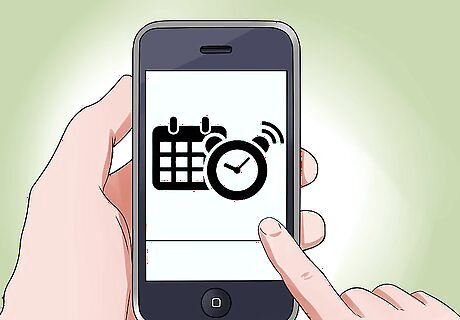
Set a reminder in your smart phone. As soon as you make your doctor's appointment, take out your phone and put it in the calendar. Most phones will allow you to set up an alarm reminding you that your appointment is coming up--five minutes, an hour, even a day or a week ahead of time. They key is to set the reminder the moment you make the appointment (or learn someone's birthday). You can set up recurring reminders, too. So if you have to pick up your little sister after tennis practice every Tuesday, you can set up a reminder that will go off every week.
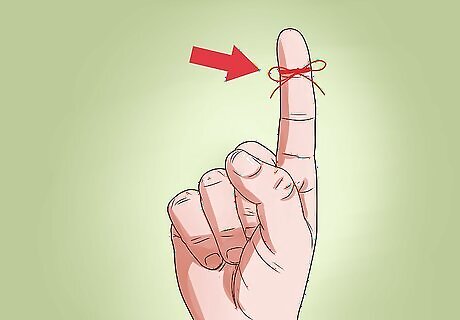
Create an unusual association. Have you ever heard of someone tying a piece of string around their finger so they won't forget something? The idea is that the string around their finger is so odd that it will remind the person of what they are trying to remember. You can make associations in all kinds of ways--the more out of the ordinary, the better. If you need to do something on your computer, place something unusual on the keyboard (like a toy boat or banana) so you remember you're going online to pay your bills, not to look at cute cat pictures.

Repeat yourself. If you are going into the bedroom to get your medication, quietly chant "medication" to yourself as you head toward the bedroom. Repeating the thought or idea keeps it active in your short-term memory (which normally holds information for only 10-15 seconds). This will help you avoid the problem of walking into a room and then wondering, "now, why did I come in here?" The more you access a thought or "use" it, more likely it will end up in your long-term memory, which can store information indefinitely. Singing about your task can also help you remember. Pick a simple tune like "Twinkle, Twinkle" or one of your favorite songs, and sing about how you're going to take your medication.
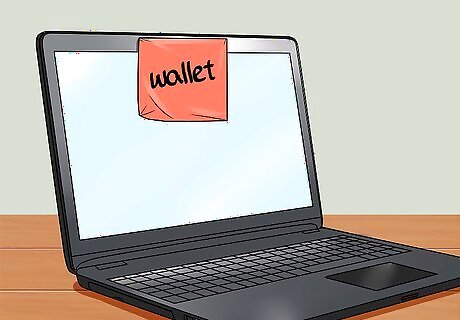
Write yourself a sticky note and place it somewhere obvious. Always forgetting your wallet? Write "WALLET" on a sticky note and place it square in the middle of your door. Try this method when you need to accomplish something on your computer--the distractions on a computer are so numerous, it's easy to get side-tracked. Put the sticky note on your computer screen, and then move it to the edge as a reminder to stay on-task.
Remembering for School

Create a study environment similar to the one where you will have to recall the information later. If you are studying for a test that will be held in a quiet room with a ticking clock, it will be easier to recall the information if you study in a similar environment, like a library or study-hall. Try not to study on the couch or sitting on your bed, since you will probably be taking the test at a desk.

Try chunking information. This means you break a piece of information, like the number 8374668809, into smaller chunks: 834 466 8809. You can better remember the information in smaller groups than as one long sequence, or by each individual piece of information. Identify the larger similarities in the information you are trying to memorize--like a significant date or location--and categorize the remaining information under these headings.

Use a mnemonic device to memorize information. Mnemonic devices are tricks used to organize information into easy to remember statements, images, or words. A common mnemonic device is Every Good Boy Does Fine, which presents the musical notes on a treble clef (EGBDF) in a simple statement. There are almost limitless ways to come up with mnemonic devices. Try making up rhymes, creating acronyms, or an easy to recall visual image.

Break up your study sessions. Instead of a single marathon cramming session, which can exhaust your brain, schedule yourself for two study sessions with a break in between. You can learn twice as much information in two three-hour study sessions than you can in one six-hour study session.
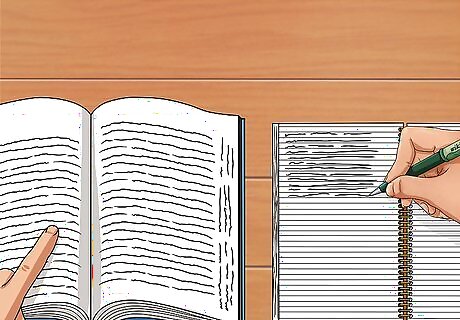
Summarize each paragraph in the margin of your book. Just reading the information isn't always enough--you need to make sense of it, too. Summarizing requires you to think about what you've just read, distill it to the essentials, and re-learn it. When you've finished reading, try to look at the subject from the broadest perspective (this is a book about history) and then keep narrowing it down (this a chapter about World War II; this is a section about the Battle of the Bulge) until you are examining the important lessons, themes, and facts you should take away (this was the last great German offensive, the massive casualties destroyed the German Army). If you don't want to mark your text book, summarize each paragraph in a notebook. You can even rip this page out and carry it in your pocket to study on-the-go.
Improving Your Memory

Exercise your body with aerobic (cardiovascular) activity. Walking, running, jumping on a trampoline--whatever gets your heart rate up will also get your brain in top form. One reason is that the exercise brings nutrient-rich oxygen to your brain, which helps your brain work better. Studies show that the effects of exercise on the brain are cumulative. That is, if you work out regularly, you will see better results than if you work out only occasionally.

Be social. People usually immediately think of doing Sudoku or Crossword puzzles to keep their brains sharp, but these "brain exercises" are actually less efficient at challenging your brain than carrying on a conversation. A conversation forces you to listen, absorb information, and process it in order to form a response.
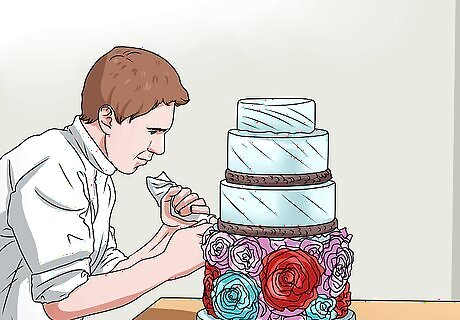
Seek out new experiences. The more often you do something, the less challenging it becomes. If you can decorate a cake without even thinking about it, it is requiring very little from your brain. To exercise and grow your mental abilities, you must push your brain. Make sure you are genuinely interested in these new activities. Faking interest isn't going to challenge your brain.

Get some sleep. Our brains are encoding (or forming memories) during our waking hours and are vulnerable to all sorts of distractions. Until your brain turns that new information into a long-term memory, those everyday distractions can lead to the loss of the information. Sleep is the perfect environment for your brain to process and turn your new memories into long-term information. Napping between study sessions is a good way to let your brain absorb everything you just learned.

Create a striking mental image. If you are always forgetting where you put your keys, try this trick: the next time you set them down, notice where you have placed them, and then picture them exploding. This trick takes advantage of our brain's ability to retain tons of visual information.



















Comments
0 comment